This insult is part of a South Western Railway campaign to tackle low-level everyday abuse of railway staff. Paul Cifton finds out why it is needed.
“We have seen verbal assaults on staff double since COVID,” says Grant Robey, crime and security manager at South Western Railway. “It is becoming much more of a problem.”
This insult is part of a South Western Railway campaign to tackle low-level everyday abuse of railway staff. Paul Cifton finds out why it is needed.
“We have seen verbal assaults on staff double since COVID,” says Grant Robey, crime and security manager at South Western Railway. “It is becoming much more of a problem.”
SWR records 40 assaults on its 5,000 staff each month, on average. Two thirds are verbal assaults, one third are physical. It believes this is the tip of an iceberg - the great majority of assaults go unreported.
There are two peak times of day for assaults. The first is at the end of the commute home - frustrated workers who are taking out their weary anger after difficult journeys, or just a heavy day at the office. The second is towards the end of the evening.
“People who’ve had a skinful,” Robey explains. “They lose their inhibitions and forget the boundaries of acceptable behaviour.
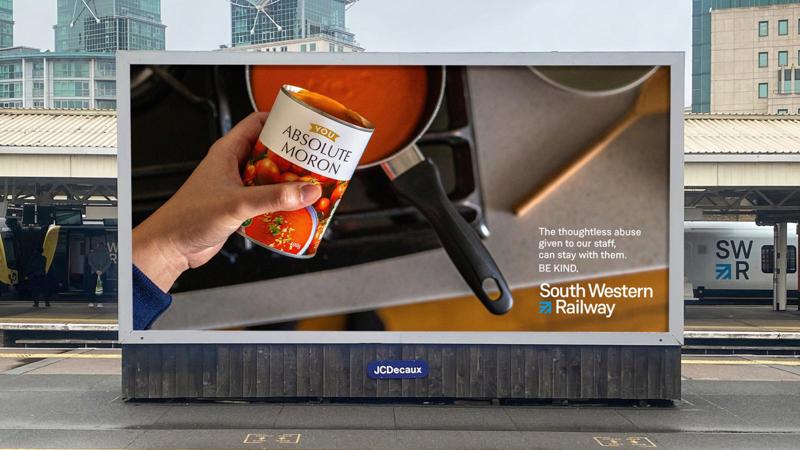
“The really bad assaults go to British Transport Police, and they’re brilliant, but they don’t have time to deal with the volume of low-level incidents.”
In an attempt to protect staff, SWR has launched a poster campaign. Not the traditional style, but one aiming to make passengers aware of the consequences of thoughtless, casual insults, momentary anger or intimidation - harsh words about personal appearance, age or gender that passengers would not routinely use, but which employees would take home, dwell on and worry about.
Words such as “You stupid old fool”, “You fat idiot”, “You dumb cow” and “You absolute moron” are shown attached to everyday household items such as a doormat, a tube of shower gel or a tin of food to demonstrate how hurtful language can stick to everyday lives.
Last year, a study by Network Rail found that nine in ten of its workers at the major stations in southern England had suffered abuse.
Why have assaults doubled?
“We have a change in the demographic of people travelling,” says Robey.
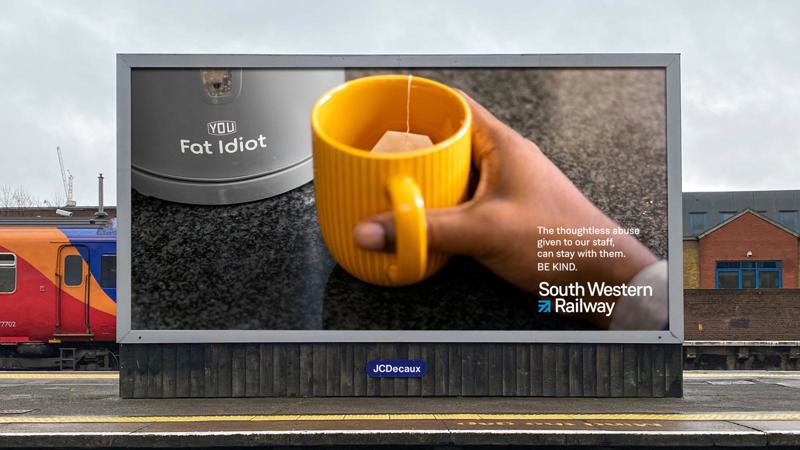
“There’s more leisure and night-time travel, which we’ve been keen to push since commuter numbers fell in the pandemic. It’s standard in the night-time economy for alcohol to be a driving factor.
“Has there also been a slip in social standards of behaviour? It’s hard to say, but it’s not only SWR finding this - it is a trend that would be recognised in any customer-facing business, whatever industry you’re in.
“This sort of low-level abuse is going through the roof.”
Matt’s story
Matt Knight is area manager for Guildford, leading a team of 40 frontline people across seven stations.
“A colleague was threatened recently just for checking a ticket. That escalated to the threat of violence with a knife. The passenger said: ‘I’ll take you outside and deal with you’.
“I’ve had a colleague racially abused, just for advising a passenger that they couldn’t go through the gateline without a ticket. They were subjected to some quite nasty abuse, which led to leaving their shift early.
“And some colleagues were confined to an office, waiting for emergency police assistance, while a group of four males were being aggressive and abusive, shouting at them through the windows and doors. Their abuse was even recorded while the staff 999 call to police was going on. And it was very personal abuse towards my colleagues.
“I’ve been insulted about my personal appearance, just walking along the platform.
“These are the more exceptional examples, but every day we have issues with staff being insulted. My team can’t just walk away - they have safety responsibilities. They dispatch trains, and they run the gateline. They just have to stand there and take it.
“That takes a toll mentally. I’ve had staff leave the industry because of the abuse. It wore them down over time.”
Gina’s story
Gina Burnish is a customer relationship manager, dealing with passenger complaints.
“I live in a small village. I was coming home after a day with a particularly bad fatality on the line. I was walking up the driveway, and my young son was waiting at the door.
“A neighbour started shouting and swearing at me on my driveway, saying I had personally delayed him that day and made him late for an appointment. My son now refers to him as Shouty Man.
“I work in the customer service centre above Southampton Central station. I had a particularly aggressive man on the phone, who knew where our office is, and said he was going to wait for me outside and ‘give it to me’ - those were his words. So, when I left the office to go home, I had to leave surrounded by a group of colleagues. He wasn’t there, but we were able to identify his address and report him to the police.
“I’ve had occasions when I’ve been named on social media and online forums in a very negative fashion.
“It makes you question yourself, ask whether you’ve perhaps done the wrong thing if it is upsetting so many people. I’m in my 26th year on the railway, and I come from a railway family. My father started on the railway at the age of 14. My brother-in-law worked at Southampton Central station for 50 years, and he had exceptionally bad abuse.
“It plays on your mind. On a bad day, we empathise with these people. We understand they’re having a rough time, because we are as well. We don’t lower our standards to theirs - the threats, swearing and abuse - we have to give them respect at all times, and it makes you quite jumpy.
“They’re keyboard warriors on their phones or laptops, hiding behind their anonymity, and they think they can get away with it.”
Ben’s story
Ben Waterhouse is a driver based at Waterloo. He drives suburban and long-distance services. Some days, he is in south-west London. On other shifts, he heads to Poole, Portsmouth or Salisbury. Before driving, he was a guard.
“It’s harder for guards. They see passengers at their worst. There are physical assaults, pushing and shoving. A lot of it is verbal. Some of it is plain and simple: you’re a moron, or worse. Some of it is based on protected characteristics - you get racism, sexism, homophobia.
“A one-off insult tends to go over your head, but it gets to you when it’s the same time and time again, especially when it’s more of a personal insult. When each person is using the same insult, without knowing others have used it before, it can really hurt.
“You take it personally, and it affects your mental health.
“Rush hour is the time when it happens more. People are making journeys they don’t necessarily want to be doing - they’re tired, stressed, and it’s busier. And, of course, there’s more during times of disruption.
“Some people say it’s worse on particular lines. You have nice routes and not-so-nice routes. Colleagues always talk about the Chessington branch and the Shepperton branch. There was a time when assaults were getting so bad, they had to stop running trains late at night, until they got security in to deal with it.
“But if you spoke to the long-distance guards, they would say the Weymouth train can be just as bad, down at the end.
“People in suits do it as well. You get one type of abuse in deprived areas, but you get a different type of abuse from people who perhaps feel they’re more entitled. They’ve paid a lot for their season tickets, and some just don’t like having their tickets checked. They don’t want to listen. You realise they want to rant, and you just have to let them rant.
“I don’t think you will ever really stop it. It doesn’t matter what area of customer service you’re in, especially if drugs or alcohol are involved. But making people more aware of the damage their spur-of-the-moment rudeness can do is a starting point.”
Will the campaign have any impact?
“Ideally, we would see a reduction in assaults,” says Grant Robey.
“But we are encouraging staff to report more abuse. So, we could actually see an increase in the number of recorded incidents.
“If we are going to see a change in behaviour, I think that would take place over a longer period. It’s hard to measure success, but this is the right thing to do as an organisation. It’s about safeguarding our staff.”
Body-worn cameras are helping to make a difference. SWR began supplying them in 2021, and they are available to all guards. Gateline staff will have access to cameras from this spring.
A study by the University of Cambridge, commissioned by the Rail Delivery Group and British Transport Police, suggested that body-worn cameras can reduce the likelihood of assault against the wearer by 47%.
“Before, it was just one person’s word against another,” Robey says.
“Now, we have a record of it. We are really trying to push this - it’s good protection.
“Another thing that’s helping is a ‘Be Kind’ badge. Twelve other train operators are using it, and we’ve taken the same design, so we are all working together.
“It’s a colourful badge, and we ask staff to wear it next to the body-worn video device. We’ve found that when someone is about to give abuse, they look down at the camera and they see the ‘Be Kind’ message – ‘I’m someone’s sister, brother or daughter’ - and it resets the interaction between them. That has quite a positive impact.”
Gina Burnish says: “We really hope this campaign will make a difference. It’s just encouraging people to think before they say something unpleasant. Doing the posters, the cameras, the badges, it’s about deterring abuse. It’s early days, but it is encouraging.”
Matt Knight adds: “We have four posters on Guildford station. As a larger station, we have more platform and gateline staff, so we get a lot more abuse at that station. It’s a big town with a university campus and a thriving night-time economy, which brings issues with alcohol and social behaviour.
“The posters are striking. They’re different from what the industry normally puts up. We need to show what is unacceptable.”
And Ben Waterhouse concludes: “Sometimes, there are delays and cancellations. There are cost-of-living pressures; there are plenty of other challenges for everyone. People’s patience has perhaps become shorter.
“But we don’t go to other people’s workplaces to insult them. It wouldn’t be acceptable to their employer to behave like that at work. It is no more acceptable on the railway. So, it would be nice if they didn’t do it to us. We are genuinely trying our best.”
For a full version of this article with more images and data, Subscribe today and never miss an issue of RAIL. With a Print + Digital subscription, you’ll get each issue delivered to your door for FREE (UK only). Plus, enjoy an exclusive monthly e-newsletter from the Editor, rewards, discounts and prizes, AND full access to the latest and previous issues via the app.
Login to continue reading
Or register with RAIL to keep up-to-date with the latest news, insight and opinion.

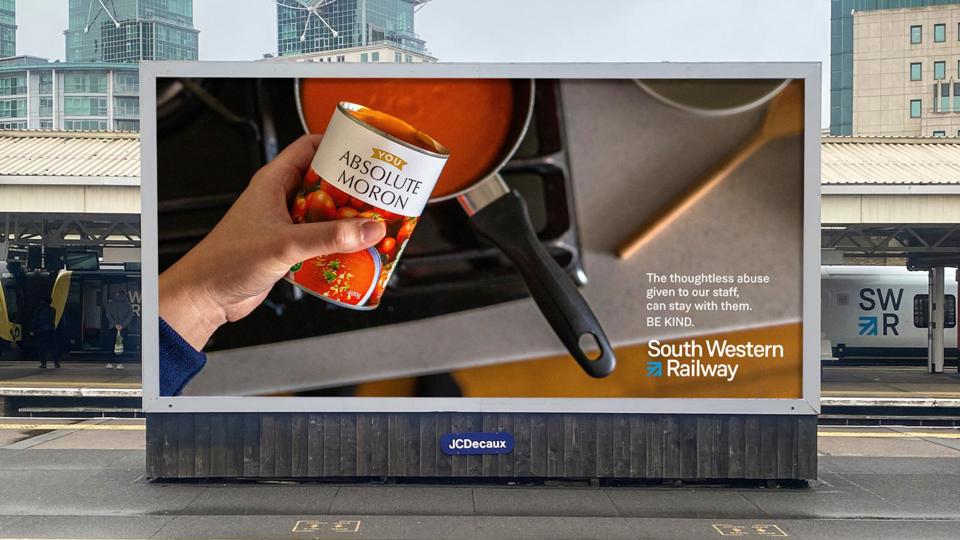


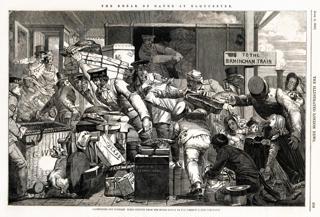
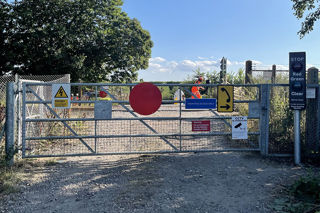













Login to comment
Comments
No comments have been made yet.